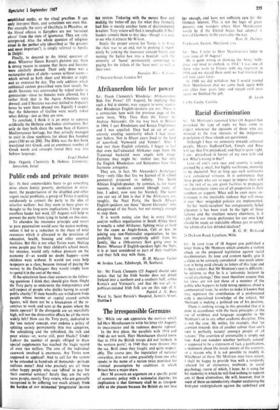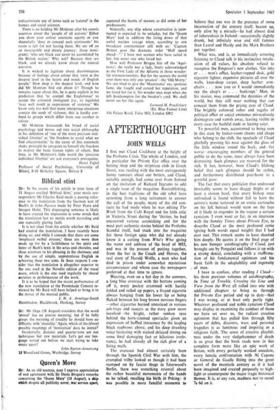Sir : In your issue of 18 August you published
a letter from a Mr Mottram which contains a violent attack on the proposed legislation against racial discrimination. Its tone and content hardly give it a claim to be seriously considered—too much aUen- lion is being paid already to letters of this type and to their writers. But Mr Mottram's case is different: he informs us that he is a 'university lecturer in .oeial psychology.' One must therefore assume that his views are not just those of a member of the public who happens to hold strong opinions about a controversial issue.. he wishes to make it known that they represent the contribution of a professional with a specialised knowledge of the subject. Mr Mottram is making a political use of his position.
There is nothing wrong in this provided that it is done in accordance with the basic principles of the use of evidence and language acceptable in Mr Mottram's or in any other academic discipline. This is not the case. He writes, for example, that 'an aversion towards skin of another colour than one's own is perfectly natural amongst people of all nations.' The assertion of universality is simply not true. And one wonders whether 'perfectly natural' Is supposed to be a statement of fact, a justification, a statement about the innate nature of the aversion, or a reason why it is not possible to modify it. Whichdver of these Mr Mottram may have meant, 1 shall be happy to provide him with a randomly 'elected list of elementary textbooks in social psychology (some of which, I hope, he is using for his students) in which he will find nothing to support any of these alternatives. He will, however, find in most of them an introductory chapter cautioning the first-year undergraduate against the undefined and indiscriminate use of terms such as 'natural' in the human and social sciences.
There is no holding Mr Mottram after his cosmic assertion about the 'people of all nations.' Either you show your colour aversions openly or you shamefully 'deny or conceal such sentiments.' No room is left for not having them. We are off on an inescapable and dreary journey: those immi- grants, 'who are black can never be assimilated by the British nation.' Why not? Because they are black, and we already know about the natural aversion.
It is wicked to legislate about discrimination because of feelings about colour that 'exist at the deepest level in the hearts and minds of English people.' How deep is the deepest level, and how did Mr Mottram find out about it? Though he remains vague about this, be is quite explicit in his prediction that 'to compel the Englishman' to accept the coloured immigrant (i.e., to legislate) 'may well result in expressions of violence.' We know only too well that many intergroup situations contain the seeds of violence; this is hardly con- fined to groups which differ from one another in colour.
Mr Mottram transcends his brand of social psychology and moves out into social philosophy in his definition of 'one of the most precious indi- vidual liberties as 'the freedom to avoid what we find objectionable.' In the name of this extremely shaky principle he arrogates to himself the freedom to restrict the basic human rights of others. But then, in Mr Mottram's little world the 'precious individual liberties' are not everyone's prerogative.
Henri Tajfel Professor of Social Psychology, University of Bristol, 8-10 Berkeley Square, Bristol 8































 Previous page
Previous page